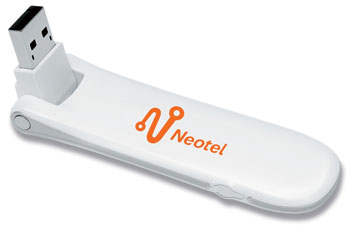 Neotel’s new NeoGo USB-based modem works exceptionally well, provided you’re in the company’s broadband EV-DO coverage areas in the major metropolitan areas. Aimed at both business and retail consumers who need a high-speed data product that offers mobility, it is competively priced compared with similar 3G-based products from Vodacom and MTN.
Neotel’s new NeoGo USB-based modem works exceptionally well, provided you’re in the company’s broadband EV-DO coverage areas in the major metropolitan areas. Aimed at both business and retail consumers who need a high-speed data product that offers mobility, it is competively priced compared with similar 3G-based products from Vodacom and MTN.
We were impressed by the speeds we got (often above 1Mbit/s on the downlink), where there was connectivity. At TechCentral’s offices north-west of Randburg, however, Neotel’s EV-DO signal is poor, resulting in the NeoGo modem providing dial-up speeds. In business areas like Sandton it worked a treat, though.
The NeoGo’s driver software is included on the modem. Installing it and getting connected is as simple as plugging it into a Windows PC or a Mac. However, Mac users should note that the software does not work properly with the newly released Snow Leopard operating system.
The modem is a Huawei Technologies EC168C that supports EV-DO Rev A. The device can be rotated to help increase reception to the built-in aerial. An external antenna can also be added, though is not supplied with the device.
At R299/month for 1,5GB of data — this includes the cost of the device — NeoGo is among the most affordable wireless solutions in the market. If you buy the modem up-front, at a cost of R1 499, you’ll pay R239/month for 1,5GB. Though the mobile operators don’t offer 1,5GB packages, Vodacom, by way of comparison, charges R289/month (device not included) for only 1GB of data.
But, unlike the Vodacom and MTN offerings, there is no fall-back when you leave Neotel’s coverage area. Whereas 3G devices offered by the mobile operators will use GPRS/Edge when 3G coverage is not available, there is no connectivity on Neotel outside the big cities. So, if you travel a lot, NeoGo is not for you. If you’re mostly city-based, though, NeoGo is a compelling, well-priced alternative to 3G.
TechCentral’s only other criticism of the NeoGo offering is that it is only available in one bandwidth size — 1,5GB. We’d have liked to have seen a range of bandwidth caps available, starting at 1GB, and going up in 500MB increments. Neotel is being too conservative with NeoGo. — Duncan McLeod, TechCentral




